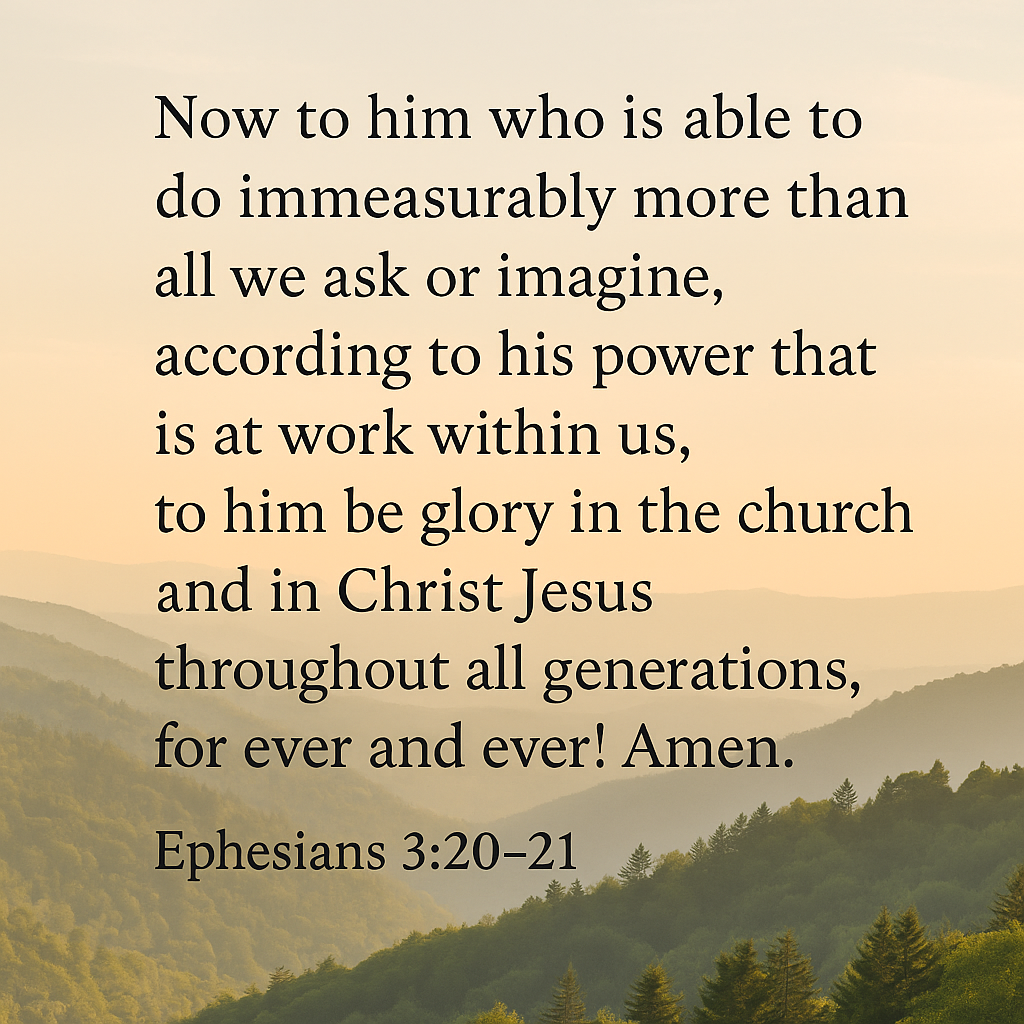We serve a God who can do the impossible.
Yet we live in a world of limitations and lack. Further, the corruption of sin and brokenness infuses our experience, causing trauma and crisis, leading many to despair. For believers, we exist in this tension—living among such impossibility but following a God for whom all things are possible.
The apostle Paul tells us our transformation results from renewing our mind. We must actively resist conforming to the ways and thinking of the world and align our thoughts with the eternal. Living from such thinking empowers us to live according to the will of God (Romans 12:2). Much of our prayer discipline calls upon the God able to do anything.
As our thinking changes, truth statements challenge our perspective, often with extreme statements lifting our vision higher. As one example, Paul shares a prayer with the church at Ephesus (and us) to expand their thinking and strengthen their faith.
“Now to Him who is able to do exceedingly abundantly above all that we ask or think, according to the power that works in us …” (Ephesians 3:20)
What Does Ephesians 3:20 Mean?

To dig deeper, we’ll look at the three main phrases making up the powerful verse.
1. “Now to him who is able”
The Greek word dunameno means “to be able, to have power, to be capable.” English uses this as the root for dynamic or dynamite. Paul leverages this word to clearly express God’s ability. His power isn’t an idea but real. The verb is active, not passive, and neither is God. The Lord intentionally acts with his power. Paul connects God’s ability with the divine identity. He is the God who acts for his people. As with the rest of the letter, power rests with God alone, not with us.
2. “To do exceedingly and abundantly above all we ask or think”
Paul writes a rare and interesting Greek phrase here. The adverb huperekperissou has three parts:
- huper – “beyond” or “over”
- ek – “out of” or “from”
- perissos – “abundant” or “exceeding”
The whole word translates to something like “exceedingly, infinitely more.” Paul essentially invents a Greek word to describe how far beyond human understanding God’s ability and work can extend. God doesn’t only exceed human expectation or imagination; he does so without measure.
Whatever we ask or think, whatever we can pray for or dream of, God can and will do more. Far more. Paul reminds the Ephesians and us how even our wildest imaginations are too small for God’s actual work and redemption.
3. “According to the power at work within us”
God doesn’t stay distant from us. Paul centers God’s ability and work within our being, using dunamis again for God’s power and energeo to be at work, like energy. The energetic dynamite of God’s power already exists within the believer. The same power that raised Christ from the dead (Ephesians 1:19-20) now operates inside of us to realize God’s purpose and mission. The Father doesn’t reserve his power far from us; the unimaginable and abundant ability of God already works inside the believer. He lives in and through us now (Galatians 2:20) to accomplish amazing things.
Paul leaves no room for small prayers or perspectives. God is beyond able. He does abundantly more than we can imagine. And he set this power in us. The apostle tries to stretch our thinking heavenward, in faith believing God to do the impossible.
Who Wrote Ephesians and Why?
Paul wrote this letter to the church in Ephesus while in Rome, in prison, around AD 60.
Once known as Saul of Tarsus, Paul had been a strict Pharisee and persecuted Christians. After Jesus visibly and audibly met him on the road to Damascus (Acts 9), Paul repented and followed Christ. Over time, he became a leader in the church in Antioch and then an apostle to the Gentiles. He traveled through the Roman Empire, planting churches and writing letters to encourage believers. The peace of Rome, along with their improved infrastructure, allowed for moderately safe travel and written communication over long distances. Paul and the early church made great use of these advantages.
Imprisoned in Rome, Paul could no longer visit churches, so he wrote several letters. He wrote to Christians and Ephesus to reconnect and communicate truths from the Spirit to encourage and empower them. Some early manuscripts don’t contain “in Ephesus,” which suggests Paul may have meant the letter to be for the whole region. He had spent more than two years planting the church in Ephesus (Acts 19), making the city a major center of early Christianity.
What Is the Context of Ephesians 3 within the Letter?
Chapter 3 sits as the center of the letter, both chronologically and thematically. The first two chapters contain deep theological truths. God’s truths don’t just stay in the academic or mystical, however. They have radical impacts on life, so Paul expands on living like Jesus on earth through practical roles like family and jobs.
Before chapter 3, the apostle wrote to remind Christians of their identity in Christ and foster unity within the church. He famously expressed how salvation comes by grace through faith alone. As such, believers, both Jews and Gentiles, are now one in a new humanity through Christ. This new identity influenced everyday life, and Paul included practical results from living a new life.
Paul starts chapter 3 by pointing to his imprisonment for Jesus for the salvation of the Gentiles. He connects this with the mystery of Christ, something he highlights often in the letter. Within this mystery, Gentiles become fellow heirs with the Jews in Christ, members of the same body of faith. Paul shifts again to share how his apostleship comes from God’s grace, a gift, and he has a privilege and responsibility to preach Jesus. God has such a plan for the whole church, so the apostle writes Ephesians 3:8-10 about the centrality of the Church to God’s eternal plan, meant to display his wisdom and power to spiritual powers.
Chapter 3 ends with a powerful prayer. Paul often shared his actual prayers over churches and people. For Ephesus, he asks God to strengthen them with his Spirit and fill them with love. These spiritual resources help to prepare for the practical and ethical impacts of living in grace, power, and love.
After the first three chapters, lifting their thinking to the heavenly identity and call, Paul urges believers to walk worthy of that call, exhibiting God’s grace in daily interactions and decisions.
How Does Ephesians 3:20 Fit within Paul’s Prayer in Ephesians and His Doctrine in Other Letters?
Paul’s prayer goes from verse 14 to 21 of Ephesians 3, and verse 20 concludes it, a type of doxology.
In the prayer, Paul calls upon God to strengthen believers with his Spirit, for Christ to live in their hearts through faith, and that the church would understand the depth of God’s love. The apostle leads up to verse 20 through focusing on God’s immense resources, power to transform, and the eternal mission of Jesus. The conclusion in verse 20 appropriately appeals to the God of the impossible to work through his people.
Ephesians 3:20 aligns with Paul’s consistent doctrine of grace and the work of Christ. Throughout his letters, Paul teaches how the Christian life isn’t lived by human strength, emotion, or intelligence. Only the power of God can save and sustain. In Philippians 2:13, he writes, “For it is God who works in you, both to will and to work for his good pleasure.” God has imparted his Spirit, the fullness of God, and dwells within our hearts. The Spirit within us isn’t a new being—it’s the same Spirit and God that parted the Red Sea, did every miracle in the Gospels, and raised Jesus from the dead. Paul calls us to rest in him within us.
Further, the Ephesians 3:20 doxology supports Paul’s theme on the sufficiency and supremacy of God. Romans 11:36 says, “From him and through him and to him are all things.” Therefore, Ephesians takes the focus from our limits to the Father’s abundance. While the work is God’s, it happens in us. God has begun and will accomplish his work in and through his people.
Paul emphasized these things for a reason. As someone who had been extremely religious, a perfect Jew, and full of his own strength, he persecuted the truth. He knew the dire state of human power, its insufficiency. Ephesians 3:20 sums up Paul’s gospel of grace, God’s divine power, and the Christian's place in God’s plan.
What Does Ephesians 3:20 Mean for Us Today?
First, the verse brings us to praise God. He did things we couldn’t do, saved us from ourselves, sin, and death. However, in his love, he did even more. The Father empowered us to be partners with him in the redemptive story he’s telling, to give us a future and eternal inheritance.
Next, Ephesians 3:20 teaches us to expect big things from God, not because of our ability but due to his work within us. This shifts our prayers from our limitations to God’s limitless ability. Too often, we pray in doubt or hedge our bets, asking what we think we can handle. But no prayer is too small or big for God. Paul challenges us to believe God wants to and will do far more than we can even think. Even our imaginations of what’s possible is too small.
The key is his power, not ours. The Spirit of Jesus, the resurrection, works within our lives—changing our hearts and guiding us to live for God’s glory. We don’t need to wait until we are smarter, stronger, or more educated. God’s power already works within us. And as the next chapter of Ephesians shows us, we live the miracles within our day-to-day lives. Yes, God still heals and delivers from demons, but those times are generally rare, compared to the rest of life. We can reveal God’s miracle as husbands, wives, kids, fathers, mothers, workers, bosses, and more.
We must live expectantly, praying bold prayers and stepping forward in faith. Not because we trust in ourselves or think we’re good enough. We trust in the one who does the impossible and loves us abundantly. Our expectation comes from God’s revealed character. We believe he is generous, giving, faithful, merciful, and actively involved.
At times, we will feel weak and insufficient. But God remains able, in and out of season. We dream big, ask courageously, and trust deeply, because the God who lives in us is greater than we can even imagine.
Peace.
Photo credit: Daniel Reche/Pixabay




